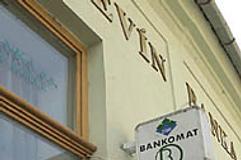Archive of articles - August 2001, page 2
If you desire to read an old article, use the search bar or select the publication date.
Latest crash adds to litany of bank woe in Slovakia
Devín banka is the fifth Slovak bank to go under forced administration in the last four years, while a sixth, AG Banka had its licence to operate as a bank removed during the same period.Slovakia's bank sector, which many domestic and foreign analysts have characterised as weak, poorly governed and burdened by a past of mismanagement and corruption, has recently been lifted by the successful sales of the two largest state banks, Slovenská sporiteľňa and Všeobecná úverová banka. The former was sold to Erste Bank and the latter to Italian IntesaBci.Consolidation is slowly beginning to creep through the sector, with Investičná a rozvojová banka (IRB) likely to be sold soon, the smallest Slovak bank, Banka Slovakia, also attracting interest, and the state's share in mid-sized bank Poštová banka soon to come under the hammer.
Sitár: Good luck to successor
Prime Minister Mikuláš Dzurinda's foreign investment advisor, Alan Sitár, stepped down from his post as head of state investment agency Sario on August 8 amid increasingly open criticism of the agency's work, and of Sitár himself.Sario's annual general meeting in late June ended with approval of a budget for this year in defiance of the Economy Ministry's own plans for Sario's future financing and operation. The ministry had already agreed to the budget plans months before, but in the end changed its mind. On August 7 the government agreed to turn Sario into a joint-stock company with the Economy Ministry in effective control.Citing an inability to find a modus vivendi with the ministry over Sario's structure and future, Sitár resigned from his position August 8.
Reader Feedback
A sad day for Slovakia's skiesSurvey story a misrepresentationLack of deeper understanding evidentSanchez letter inaccurate and an affront
Top Pick: Imrich Weiner-Kráľ: Painting exhibition
A bohemian, a football player and a devout communist, Imrich Weiner-Kráľ (1901-1978) was one of the founders of the Slovak Modernism movement and a leading representative of Slovak Surrealism. Nevertheless, despite creating a personalised and unique style never before seen anywhere in the world, he has remained unappreciated and misunderstood on his native Slovak soil."Maybe it was because he was Jewish, or maybe it was because he was influenced by the French, Hungarian and German cultures rather than focusing on Slovak art styles that he was so unappreciated," said Ján Ábelovský, the curator of the Imrich Weiner-Kráľ exhibition being held at the Slovak National Gallery in honour of the 100-year anniversary of the artist's birth. "Simply speaking, he was a lonely runner of Surrealism in Slovak art history. He was left with no contemporaries nor followers."
Devín banka's history: Controversial past never outlived
Devín banka's forced administration brings an end to a saga of contention and suspicion surrounding the bank since its foundation in 1992.Formed with a basic capital of just 444 million crowns ($8.8 million) by insurance firm Slovenská poisťovňa and the Slovak Union of Cooperative Producers, the bank ran into financial problems almost immediately, forcing it to look to new investors and beginning the finance house's connections to Russian groups.
Around Slovakia
One dead, 18 injured in bus crashTwenty foot python stolenAnnual rail pentathlon in central Slovakia
Community Corner
Chambers of Commerce Sports DayNational Month of MexicoAmerican football clubOrganised RunsTime exhibition
ST monopoly wilting under customer defection to mobiles
Figures released by fixed-line monopoly Slovenské telekomunikácie (ST) in mid August showed that for the first time in Slovakia's history, the number of fixed line telephone links fell below the number of mobile phone users. ST registered a drop of 57,000 in the number of fixed line links in July to 1,630,987. In the same month, the number of new clients using the services of the mobile phone operator Eurotel rose by 64,000, the company claimed.The new clients have pushed the total number of mobile users of Eurotel, and Slovakia's other mobile operator, Globtel, to 1,635,276. Globtel has yet to release its own customer numbers for July.
Bureaucrats still defying state sector cuts plan
Just as last year's audit of Slovakia's bureaucratic corps begins to produce its first budgetary savings, several state ministries have made new demands for more taxpayer money, and have refused to enact the cost-cutting measures called for by the government.The Labour Ministry, for example, has protested that the civil service employment bill it proposed - one that would have added a further 2 billion to bureaucrats' collective wages - was nipped in the bud in parliament this past July. The ministry has promised to try again this fall. Meanwhile, the Agriculture and Education Ministries, among others, are openly boycotting much of what the cabinet has asked them to do: to close down some organisations funded from the state budget, and slash the spending of others.
SMK: Coalition must pass law, or we leave
DVORY NAD ŽITAVOU, BRATISLAVA: The Slovak government has been given an ultimatum by one of its own member parties - to pass a law in parliament ceding central state powers to newly created regional units by September 30, or say goodbye to the Hungarian Coalition Party (SMK).The SMK's decision, reached August 25 at the party's national council meeting in the tiny south Slovakia village of Dvory nad Žitavou, drew mixed reactions from its coalition partners, but on the whole, the response was an angry one.Prime Minister Mikuláš Dzurinda said he was optimistic the deadline, and even a September 15 cut-off for cabinet approval of the law, could be kept. He called the SMK summit result "positive and encouraging".
- Pastoral letter divides Slovaks
- News digest: Slovakia is being hurt by its failure to integrate foreign workers, says auditor
- Hollywood turns Slovak highlands into high-speed playground Video
- News digest: ‘Charlatans and quacks’: Pandemic investigator accuses scientists, pushes for jab ban Video
- Authoritarian echoes from Delhi to Bratislava
- Top 10 events in Bratislava for foreigners
- A café in an ice cellar, sand dunes and a flower shop at the border
- Bratislava opens new support centre for foreigners
- News digest: ‘Charlatans and quacks’: Pandemic investigator accuses scientists, pushes for jab ban Video
- Bratislava opens new support centre for foreigners
- Pastoral letter divides Slovaks
- You say nazdar, I say dovi
- Top 10 events in Bratislava for foreigners
- A café in an ice cellar, sand dunes and a flower shop at the border
- Hollywood turns Slovak highlands into high-speed playground Video
- Neuroimmunologist Norbert Žilka: Slovakia in Alzheimer's research premier league
- Bratislava opens new support centre for foreigners
- Hollywood turns Slovak highlands into high-speed playground Video
- You say nazdar, I say dovi
- A café in an ice cellar, sand dunes and a flower shop at the border
- Top 10 events in Bratislava for foreigners
- Independent cultural space on Bratislava embankment to end soon
- Chicken Jockey! Chicken Jockey! Chicken Jockey! Video
- Záhorie uncovered: Slovakia’s quiet corner full of surprises Photo
- Last Week: And then they came for the NGOs
- What abides: Giving a shit
- Slovakia brings back border checks with Hungary and Austria starting April 8
- Bratislava opens new support centre for foreigners
- Hollywood turns Slovak highlands into high-speed playground Video
- Štítnik resumes hand-crafting Christmas ornaments after 25 years
- You say nazdar, I say dovi
- A café in an ice cellar, sand dunes and a flower shop at the border
- News digest: Slovakia is being hurt by its failure to integrate foreign workers, says auditor
- Forget the spa – Bojnice’s trails are the real therapy Photo
- Košice steelworks sinks deeper into the red
- A 'pink moon' will grace Slovak skies this Sunday
- Authoritarian echoes from Delhi to Bratislava
- Weekend: A sports event to get your running fix Photo
- Record-breaking Bratislava Marathon supports visually impaired athletes
- News digest: ‘Charlatans and quacks’: Pandemic investigator accuses scientists, pushes for jab ban Video More articles ›






